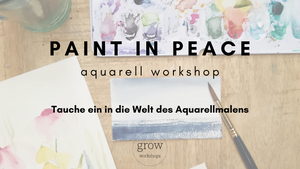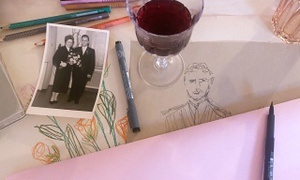unsichtb:ART - mentale zustände künstlerisch begreifen
In the organizer's words:
How can we better understand the psyche? This exhibition aims to turn concepts and diagnoses into concrete art - so that we can better understand, normalize and empathize with mental health and illness. To this end, young people havegiven free rein to their creativity - to materialize what otherwise takes place in the mind.
The exhibition takes place in the corridors and in the stairwell on the 1st & 2nd floor.
NOTES ON CONTENT
The contents of the exhibition contain depictions (in word and image) on the following topics: suicidal tendencies, physical, psychological or sexualized violence, self-harming behaviour, mental illness, death and other serious crises.
These topics and conflicts are part of everyday life for many people. The exhibition aims tohelp break down the taboos and destigmatize these realities and the associated pain so that those affected can be helped more quickly and effectively.
We understand it as a of the tasks of art, to conveycomplex social and political topics on a sensual level and to make them tangible in order to create a moving experience for all participants.
The sensitization of every person is different and shaped by their own history. Therefore, some people may react more sensitively to issues than others. We haveleft it up to the artists themselves to decide whether or not they providetheir artworks with a content warning or categorization and respect this decision, as we want to and must preserve artistic freedom.
We ask you to decide for yourself whether and how intensively you want to expose yourself to these topics and artworks and ask you to seek support and help if necessary. If you notice that someone in your immediate surroundings needs help, please do not hesitate to approach them and ask how you can help them.
At the same time, as a project for mental health, we see it as our responsibility to point out existing help services and contact points for mental health crises, regardless of their severity:
In acute crises or suicidal behavior: 112 (emergency services) or 110 (police)
Medical on-call service: 116117
Number against grief (parents): 0800-111-0-550 or nummergegenkummer.de
Number against grief (children and young people): 116111 or
0800-111-0-333 or nummergegenkummer.de
Violence against women helpline: 0800-116016 or hilfetelefon.de
Help hotline for violence against men: 0800-1239900 or maennerhilfetelefon.de
Help portal and help telephone for sexual abuse: 0800-2255530 or hilfe-portal-missbrauch.de
Telephone counseling: 0800-111-0-111 or 0800-222-0-222
Nora emergency call app: nora-notruf.de
If you have any questions about psychotherapeutic treatment, your family doctor is usually the first point of contact.
An initial overview of psychotherapeutic services can be found on the
website therapie.de.
This content has been machine translated.
website therapie.de.
Location
VHS Köln
Cäcilienstraße 35
50667 Köln
Organizer
junge Stadt Team
Köln
Organizer
VHS Köln
Köln













